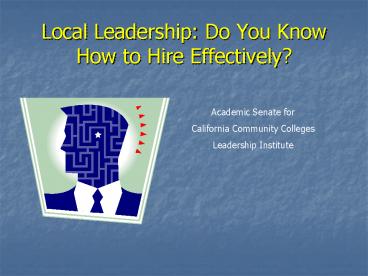Local Leadership: Do You Know How to Hire Effectively - PowerPoint PPT Presentation
1 / 13
Title:
Local Leadership: Do You Know How to Hire Effectively
Description:
The Chair of a search committee for this administrative ... Conducting a Successful CEO Search (Excerpted from the Community College League of California) ... – PowerPoint PPT presentation
Number of Views:19
Avg rating:3.0/5.0
Title: Local Leadership: Do You Know How to Hire Effectively
1
Local Leadership Do You Know How to Hire
Effectively?
Academic Senate for California Community
Colleges Leadership Institute
2
The Hiring of New Faculty
According to the Education Code, the local
academic senate works jointly with the local
governing board to establish policies and
practices for hiring faculty. Thus, it is
imperative that local senates understand the
laws, regulations, and Academic
Senate-recommended practices to ensure they meet
their consultative obligationsand hire
effectively.
3
Faculty
- Those employees of a district who are employed in
academic positions that are not designated as
supervisory or management for purposes of Article
5. Faculty include, but are not limited to,
instructors, librarians, counselors, community
college health service professionals, disabled
student programs and services professionals,
extended opportunity programs and services
professionals, and individuals employed to
perform a service that, before July 1, 1990,
required nonsupervisorial, nonmanagement
community college certification qualifications. - (Authority cited Sections 66700, 70901, 87001,
and 87002, Education Code)
4
. Definitions
- Experience The requirement is for the stated
number of years of full-time experience or the
equivalent in part-time experience. (Ed Code
53404). - Certificated Employees Persons employed by
districts pursuant to minimum qualifications (Ed
Code 53405).
5
Requirement for Accredited Degrees and Units
- All degrees and units used to satisfy minimum
qualifications shall be from accredited
institutions.
6
RESOURCES
- In the fall of 1989, the Academic Senate adopted
two papers on faculty hiring - Contract Faculty Hiring Procedures A Model Based
on Assembly Bill 1725 and Part-time Faculty
Hiring Procedures A Model Based on Assembly Bill
1725. - Faculty are encouraged to review both papers and,
with them, the legislative intent language of AB
1725 4, upon which the papers draw heavily. The
models posited in those papers are still valid
today.
7
A Re-examination of Faculty Hiring Processes and
Procedures (ASCCC, Adopted Fall 2000)
- The California Education Code is unequivocal in
its assignment of authority to faculty in the
realm of hiring. Section 87360 (b) reads - Hiring criteria, policies, and procedures for
new faculty members shall be developed and agreed
upon jointly by representatives of the governing
board, and the academic senate, and approved by
the governing board.
8
Two things are significant here. First,
- this mandate appears in Education Code, rather
than in Title 5 Regulations, and whereas both
Education Code and Title 5 Regulations have the
force of law, this mandate is clearly the express
intent of the Legislature.
9
Second,
- there is no qualification of the mandate, no
specification of circumstances wherein it would
be permissible for boards to circumvent the
requirement to reach joint agreement with the
academic senates.
10
These two points
- combine to make the authority of faculty in
hiring even stronger than in the ten-plus-one
academic and professional areas specified in
Title 5 53200. - That faculty have the discipline expertise and
the motivation to set the highest possible
standards in selecting those who will be their
colleagues for the next twenty to thirty years is
simply unarguable.
11
When Hiring Superintendents and Presidents
- The Chair of a search committee for this
administrative position is most frequently a
senior administrator with academic or student
services experience it is also not uncommon to
have a faculty member co-chair this
responsibility. Such an arrangement builds
district-wide trust in the entire selection
process.
12
Conducting a Successful CEO Search(Excerpted
from the Community College League of California)
- Because the outcome of the selection process is
so important, it should never be taken lightly or
conducted in haste. The entire districtand
particularly the boardwill benefit from a
comprehensive and thoughtful process that
involves the appropriate constituencies of the
institution and community and clarifies goals and
priorities. Such a process allows the board to
select a person it can support fully and
establishes a foundation that enables the new
leader to be effective.
13
Conclusion
- Faculty have a vested interest in who will be
their colleagues, in who will teach and advise
their students, in who will work with them to
develop and safeguard the curriculum and uphold
the sort of instruction that is maximally
productive of humane values and which contributes
toward students becoming informed, compassionate
and productive members of their communities. - (The Future of the Community College A Faculty
Perspective (adopted Fall 1998) .































